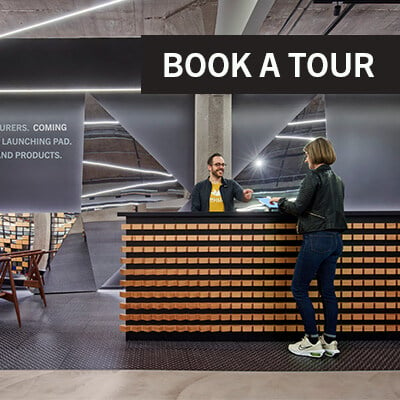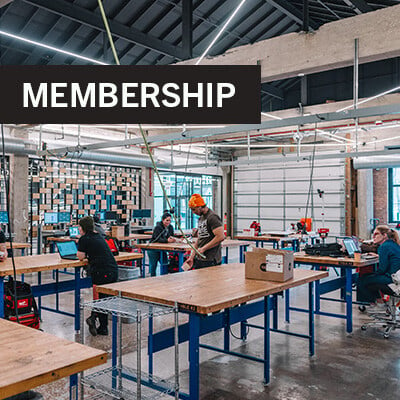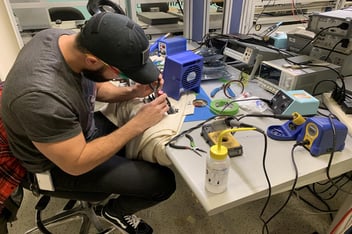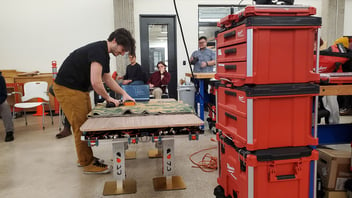Early Stage Startup Founders Experience Challenges Developing Physical Products
Many entrepreneurs and early-stage startups start their businesses out of a home or garage. A decade ago, it was estimated that 69% percent of U.S. entrepreneurs started their businesses1 this way, and today that number is likely higher because it’s a cost-effective way to launch a venture and test ideas before scaling. While starting out ‘small and scrappy’ makes sense from a low-cost perspective, there are definitely pain points associated with bootstrapping your startup.
mHUB Co-Founder, Bill Fienup, shares his personal founder journey and the bumps in the road he encountered. Read on to get ahead of the curve balls or avoid them altogether.
Access to the Right Tools and Equipment
Innovators who are working to create physical products often need fabrication tools and equipment to build their initial prototypes. Fienup says, “I had been utilizing 3D printers at universities and then had friends that were still in school print 3D pieces for me, but eventually it became challenging to continue prototyping without access to the right tools and equipment. This lack of access to prototyping equipment was one of the core motivators for organizing what would become the mHUB innovation center for product development.”
Even the entrepreneurs who start out with the right tools can quickly outgrow space. Amazon founder Jeff Bezos admitted in a 1998 interview2, “I know why people move out of garages. It's not because they ran out of room. It's because they ran out of electric power. They have so many computers in the garage that circuit breakers kept flipping. We couldn't plug in a vacuum cleaner or a hair dryer anymore in the house." When your prototypes start requiring increased power demand, custom made PCBs (printed circuit boards), or larger equipment such as CNC machines, mills, or presses, that’s when it’s time to start looking for a resource that can accommodate your startup needs.
Access to a Founder Community with Diverse Backgrounds, Education, and Skill Sets
Founders who form startups with a group of friends might realize their friends may have the same skill sets that they do and cannot help solve for the array of problems that arise during early product development stages.
Fienup continues, “throughout my founder journey, I recognized I didn’t have ALL the knowledge I needed during my product development phases. I’m a mechanical engineer. I didn’t necessarily know all the things an electrical engineer knows, so I had to learn a lot of that. I ended up learning that I really needed a community with diverse backgrounds, education and skill sets to tap them for knowledge and help as needed.”
That led Fienup to founding "Catalyze Chicago” the prototype to mHUB. This was a group of really passionate product developers and startups with knowledge across several different disciplines – industrial design, electrical engineering, software / firmware, UX/UI, robotics, and others.
“Our grassroots community had a lot of volunteers, and people had to juggle income-earning jobs in addition to steering their startups. Thankfully I found World Business Chicago and Haven Allen, who has amazing business acumen and is a great CEO fit to my CTO skills. Together, we were able to transform Catalyze Chicago into mHUB, one of the nation’s leading innovation centers for product development.”
Read more about building your startup team.
Access to capital
Businesses need money to operate. Many start out raising money from family and friends or through crowdfunding campaigns and donations. “In the beginning, I had to put up a lot of my own capital into the organization to fund it until Catalyze Chicago evolved into mHUB and secured funding through the EDA and some of our corporate partners,” shares Fienup.
The percentage of startups that secure funding from venture capital varies widely and depends on factors such as the industry, location, and economic conditions. Generally, around 1% to 5 % of small businesses receive venture capital funding, but keep in mind that these figures can change over time and are influenced by market trends and investor preferences. See mHUB’s 2023 Investor Report for the latest insights into venture capital trends for hardtech startups.
Access to a manufacturing network
When you’re just starting out, you’re manufacturing each prototype ‘in-house’ because there are not many manufacturers who want to produce ‘one-offs’. Even when you get to the point where you can manufacture a low volume production run, it can be hard to find a manufacturer that is willing to produce a low-volume quantity. Startups must go through a bit of a ‘match-making’ process.
“I recommend startups find local, domestic manufacturers to work with,” states Bill. “When you're in early stage, it's a must. It allows you to learn quickly and enables you to physically go to the production site, see their capability, and build relationships with that supplier. You want a relationship and trust that will get you through the ‘ups and downs’ of being a startup. You want a manufacturing partner to be there for you when you're ready to really pick up and grow.”
Read How to Hire for Contact Manufacturing for more in-depth early-stage startup insights.
Conclusion
“It is important to me that mHUB Members have access to all the things I used to struggle with – resources, community, mentorship and manufacturing networks,” shares Bill. “When we started out in 2017, I thought the tools and the equipment was really going to attract people, and while that’s still true, startup founders here really value the community, the people, the friendships and the connections they make.”
Learn more about the offerings at mHUB's innovation center, which is tailored for hardtech startups developing new physical products.
References:
1 - https://smallbiztrends.com/2013/07/home-based-businesses-startup.html#:~:text=69%20Percent%20of%20U.S.%20Entrepreneurs,at%20Home%20%2D%20Small%20Business%20Trends
2 - https://www.businessinsider.com/jeff-bezos-1998-interview-steve-homer-startup-space-2018-10





